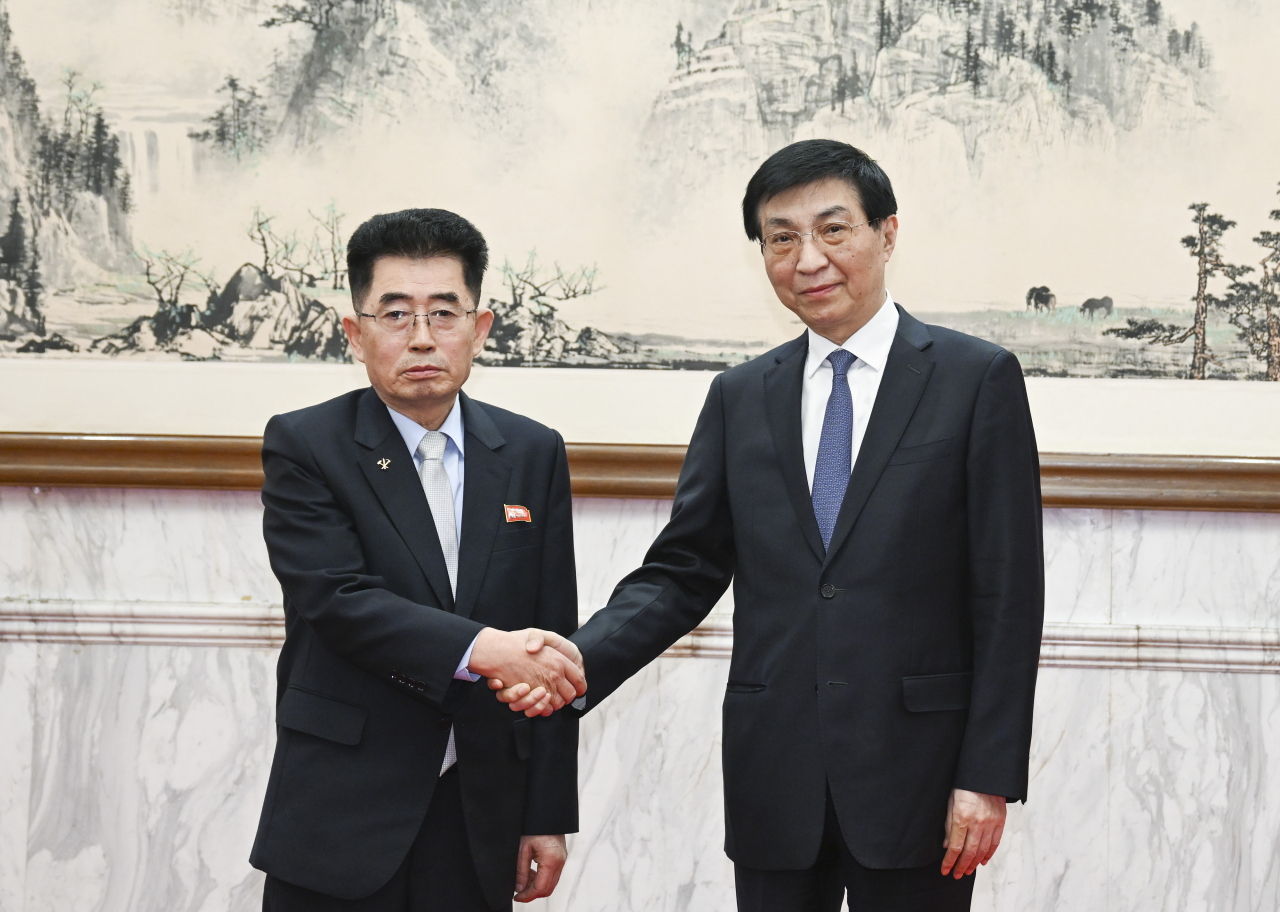
The Chinese Communist Party's No. 4 official Wang Huning met Kim Song-nam, who serves as North Korean director of the international affairs department of the Party Central Committee and is recognized as a China expert, on Thursday in Beijing, the Chinese Embassy in North Korea said Friday.
The meeting focused on enhancing bilateral relations and cooperation, coinciding with the commemoration of the 75th anniversary of the establishment of diplomatic ties between the two countries, which falls on Oct. 6 this year.
Wang highlighted that the traditional friendship between China and North Korea has steadily strengthened and developed under the nurturing guidance of the two countries' leaders, Xi Jinping and Kim Jong-un, the embassy said.
"China is willing to work with the DPRK to transform the important consensus reached by the top leaders of the two parties and the two countries into practical actions to promote China-DPRK friendship, deepen unity and cooperation, and strengthen strategic communication and work together to create a peaceful and stable external environment," Wang was quoted as saying in the statement.
The DPRK is the official name of North Korea, the Democratic People's Republic of Korea.
Kim Song-nam said he believed the "DPRK-China Friendship Year will promote exchanges and cooperation in various fields between the two sides and promote greater development of the socialist causes of the two countries."
This is Kim's first overseas visit since assuming the position of director of the international affairs department of the Central Committee of the Workers' Party of Korea in January 2021.
With prior experience studying in China, Kim has been a stalwart of the international affairs department since the 1980s, consistently serving as the dedicated interpreter for visits by former leaders Kim Il-sung and Kim Jong-il during their trips to China.
Kim also met Liu Jianchao, minister of the international department of the Central Committee of the Communist Party of China, on Thursday in Beijing, according to the Chinese Embassy in North Korea on Friday.
Liu is a high-profile diplomat who has been emerging as a leading contender for the position of the next Chinese foreign minister.
Lin said China seeks to "promote friendly exchanges and practical cooperation in various fields, and continuously advance China-DPRK relations for the benefit of both peoples, and to promote regional peace, stability, development, and prosperity" seizing the 75th diplomatic anniversary as an opportunity.
Kim said North Korea was "willing to work with China to fulfill the duties of the foreign departments of the two parties," in accordance with the directives of the two leaders. Additionally, Kim said North Korea aims to advance the comprehensive development of friendship and cooperation between Korea and China.
Furthermore, the two also exchanged opinions on mutual concerns, including the situation on the Korean Peninsula, according to the embassy.
Yang Moo-jin, a professor at the University of North Korean Studies in Seoul, said that "Kim's visit marks the full-fledged activation of substantive contacts at the party level, aimed at expanding various exchanges this year," which has been designated as the 75th anniversary of diplomatic relations and a year of friendship.
Yang also explained that Kim's visit was indicative of North Korea's strategy to enhance its engagement with China, particularly following China's Two Sessions.
The move aligns with North Korea's broader objectives of breaking out of isolation and extending its socialist influence beyond its borders.
On Friday, North Korean state media also reported that the WPK's delegation, led by Kim, left Pyongyang on Thursday for visits to China, Vietnam, and Laos -- all socialist countries in Asia.
"North Korea has so far placed a significant emphasis on close ties with Russia. However, there's now a dual-track diplomatic strategy in play, focusing on both North Korea-Russia and North Korea-China relations, aimed at bolstering solidarity within the socialist sphere."
Yang added that Kim's trip could also be interpreted as an attempt to placate China, amid North Korea's strengthening alignment with Russia.
"Another objective is to broaden subsequent practical engagements and revive interpersonal exchanges following high-level inter-party exchanges," Yang said.
"This includes efforts to attract tourists as a significant source of foreign currency earnings, particularly in anticipation of the tourist season. Moreover, North Korea would consider that attracting Chinese tourists would yield a more substantial ripple effect compared to Russian tourists."





